The SEO world is changing faster than ever. As Artificial Intelligence (AI) becomes deeply integrated into search engines, it’s redefining how websites get discovered, ranked, and trusted.
In 2025, SEO (Search Engine Optimization) and AI are no longer separate, they power each other. Modern platforms like Google’s Search Generative Experience (SGE), Bing Copilot, and ChatGPT Search don’t just read what users type, they interpret why they’re searching.
This shift means SEO is no longer just about keywords and backlinks. It’s about teaching AI to recognize value, intent, and authority. Businesses that adapt are now appearing in AI-generated summaries, voice search results, and visual recommendations, gaining visibility beyond traditional search pages.
What is AI SEO?
AI SEO (Artificial Intelligence Search Engine Optimization) is the process of using AI tools, data, and machine learning to improve how your website appears in search results.
It helps businesses:
- Understand user intent beyond simple keywords
- Create smarter, data-driven content
- Optimize for voice, visual, and generative search
- Predict future trends in search behavior
AI SEO combines the power of automation with human creativity. The goal is to make your website not only rank higher but also be understood and trusted by AI-driven search engines.
Why AI SEO is Crucial for Businesses in 2025
In 2025, over 70% of online searches are influenced by AI algorithms. These algorithms decide what content appears in chat-based search results, voice responses, and featured snippets.
Here’s why AI SEO is now essential:
- Search engines think like humans. They evaluate tone, trust, and expertise.
- User searches are conversational. People now ask questions instead of typing phrases.
- AI rewards quality. Search engines prioritize content that’s accurate, authentic, and valuable.
Simply put, AI SEO ensures that your website stays visible and competitive, no matter how search behavior evolves.
From Traditional SEO to Intelligent Search: The Big Shift
The move from traditional SEO to AI-powered SEO marks a major evolution in digital marketing. Let’s look at how it’s changing the game:
1. From Keywords to Intent: Earlier, SEO was about fitting in the right words. Now, AI understands context, tone, and intent. That means you should focus on why users are searching, not just what they’re typing.
2. Content Quality Over Quantity: AI prioritizes useful, original, and experience-backed content. Thin, repetitive posts no longer rank well.
3. Personalized Search Results: AI tailors results based on each user’s preferences, location, and search history. This means businesses must create personalized, audience-specific content.
4. Rise of Voice and Visual Search: Voice queries and image recognition tools are reshaping SEO. Optimizing for natural language and multimedia elements is now a must.
Essential AI Tools for 2025
The right tools can help automate and enhance your AI SEO strategy. Here are some of the most effective ones for 2025:
- Surfer SEO: Uses AI to analyze SERP data and suggest on-page improvements.
- Clearscope: Helps refine your content using semantic keywords and readability insights.
- MarketMuse: Identifies content gaps and suggests topic clusters to build authority.
- ChatGPT / Gemini AI: Assists in creating conversational, question-based content.
- Frase.io: Generates SEO-friendly content outlines using AI insights.
These tools help marketers optimize faster, create smarter, and analyze deeper, ensuring your content aligns with how AI engines interpret information.
Implementing AI SEO: Smart Practices for Success
To make the most of AI SEO, you need a strategy that balances automation with creativity. Here are the best practices to follow in 2025:
To effectively apply AI SEO, follow these best practices:
1. Optimize for Conversational Search: Write in a natural tone and include question-based headings.
Example: “How can businesses use AI in SEO?” works better than “AI SEO Tips.”
2. Use Structured Data (Schema Markup): Add schema for articles, FAQs, and products to help AI understand your content’s purpose.
3. Strengthen E-E-A-T (Expertise, Experience, Authoritativeness, Trustworthiness): Include author bios, link to credible sources, and share first-hand insights.
4. Create Multimodal Content: Include videos, images, and infographics — AI engines analyze visuals along with text.
5. Focus on User Experience: Fast-loading pages, mobile-friendly layouts, and clear structure improve engagement, which AI tracks closely.
Challenges
While AI SEO offers big advantages, it also brings unique challenges:
- Overdependence on AI tools: Relying only on automation can reduce originality.
- Data privacy concerns: Personalization depends on collecting user data responsibly.
- Evolving algorithms: AI systems update frequently, requiring ongoing adaptation.
- Content authenticity: With so much AI-generated content, maintaining trust and human touch is vital.
Balancing AI assistance with human creativity is key to overcoming these hurdles and ensuring your SEO strategy remains authentic, adaptive, and impactful.
The Road Ahead: What’s Next for AI SEO
The future of SEO will be more personalized, predictive, and human-like. Here’s what’s coming:
- Voice-first search will dominate with smart assistants.
- Real-time SEO optimization powered by AI analytics will guide content instantly.
- Hyper-personalized experiences will make every search unique.
- Ethical AI SEO will become the foundation of trusted brands.
The next phase of SEO is not just about ranking higher — it’s about building meaningful connections through intelligent, trustworthy content.
Conclusion
AI is transforming SEO from a keyword-focused game into a context-driven, intelligent system.
To stay ahead in 2025, focus on:
- Creating authentic, intent-based content
- Leveraging AI insights and structured data
- Strengthening E-E-A-T and user trust
- Combining human creativity with AI efficiency
By adapting to these new rules, your brand can not only survive but thrive in the AI-powered search era — where relevance, trust, and experience define success.




